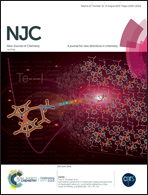PCL–DOX microdroplets: an evaluation of the enhanced intracellular delivery of doxorubicin in metastatic cancer cells via in silico and in vitro approaches†
Abstract
Researchers have promoted the use of polymer microspheres in medical engineering and biotechnology, such as embedded drug delivery with polylactic acid microspheres. Polycaprolactone (PCL) is a kind of semi-crystalline polymer, which can be utilized in many varieties of organic solvent. Therefore, PCL has been used as a controlled-release drug carrier for long-term treatment. This study focuses on the fabrication process of biodegradable PCL microcarriers with uniform and controllable particle size (size range is ∼5–100 μm) via an emulsion-solvent evaporation process with ultrasonic micro-droplet atomization technology. Through ultrasonic atomization, micro-droplets of PCL solution were sprayed out directly with highly uniform particle size. The oil micro-droplets of PCL were collected with an aqueous stream in an emulsion process to form a water–oil–water emulsion. The ultrasonic atomizer assisting the emulsification process was adjusted via the stirring equipment to enhance the particle size uniformity. As a result, PCL micro-droplets were sprayed into aqueous solution due to the vertical flow field made by the stirring equipment. The yield rates of PCL microcarriers were improved effectively. Moreover, the cancer pharmaceutical doxorubicin (DOX) was added into the process to obtain drug-loaded microcarriers. The drug-loading efficiency in this process was ∼42.2%, and the encapsulation efficiency of the microcarriers was ∼3.21%. Further, we performed docking and MD simulations of the polycaprolactone–doxorubicin hydrochloride interaction that showed their binding affinity and later validated potential inhibitors. Additionally, we have successfully established the dynamic behavior of an entire biochemical pathway in the presence of polycaprolactone with doxorubicin hydrochloride, using a systems biology approach.



 Please wait while we load your content...
Please wait while we load your content...